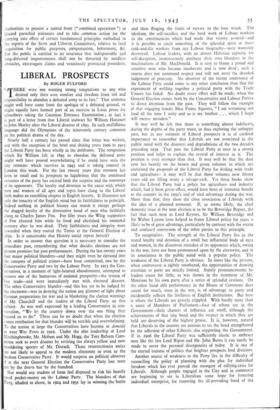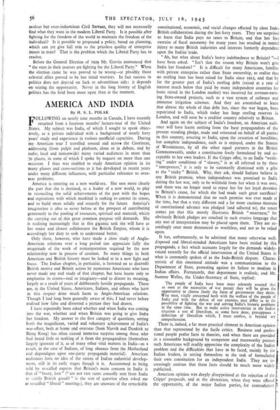LIBERAL PROSPECTS
By ROGER FULFORD " HERE were not wanting strong temptations to any who
I desired only their own comfort and freedom from toil and responsibility to abandon a defeated army to its fate." That sentence might well have come from the apologia of a defeated general, or might equally have formed part of an exercise in Latin prose for schoolboys taking the Common Entrance Examination ; in fact it is part of a letter from that Liberal stalwart Sir William Harcourt to John Morley after the Liberal disaster of 1895. In such mellifluous language • did the Olympians of the nineteenth century comment on the political drama of the day.
Nearly half a century has passed since that letter was written, and with the exception of the brief and shining years 1906 to 1915 the Liberal Party has been wholly in the doldrums. The temptation which Sir William felt in 1895 to abandon the defeated army might well have proved overwhelming if he could have seen the tiny remnant which survives in 1943 and is taking counsel in London this week. For the last twenty years that remnant has been so small and its prospects so lugubrious that the continued existence of the party has excited both the surprise and the contempt of its opponents. The loyalty and devotion to the cause with which men and women of all ages and types have clung to the Liberal faith makes an ennobling chapter in English history. It illustrates not only the tenacity of the English mind but its faithfulness to principle. Indeed nothing in political history can match it except perhaps the dogged loyalty of the diminutive band of men who faithfully clung to Charles James Fox. For fifty years the Whig supporters of Fox cheered him while he lived and cherished his immortal memory after he was dead. Their faithfulness and integrity were rewarded when they routed the Tories at the General Election of 1830. Is it conceivable that History could repeat herself?
In order to answer that question it is necessary to consider the immediate past, remembering that what decides elections are not present promises but past• performances. During the last twenty years four major political blunders—and they might even be elevated into the category of political crimes—have been committed, two by the Conservative Party and two by the Labour Party. In 1923 the Con- servatives, in a moment of light-hearted abandonment, attempted to remove one of the buttresses of national prosperity—the system of free trade—and were immediately "met with electoral disaster. The other Conservative blunder—and this has yet to be judged by the electorate—was in denying the nation any glimmer of light about German preparations for war and in blanketing the clarion warnings of Mr. Churchill and the leaders of the Liberal Party on this subject. As was well expressed by a leading Conservative in con- versation, "We let the country down over the one thing they trusted us to do." There can be no doubt that when the election comes retribution for that blunder will be terrible and overwhelming. To the nation at large the Conservatives have become as demode as were Wee Frees in 1919. Under the able leadership of Lord. Hinchingbrooke, Mr. Molson and Mr. Hogg, the Tory Reform Com- mittee seek to avert disaster by reviving the always yellow and now mouldering spectre of Mr. Disraeli. Those resurrectionist antics are not likely to appeal to the modern electorate or even to the modern Conservative Party. It would surprise no political observer :f at the next General Election the Conservative Party lost seats not by the dozen but by the hundred.
Nor would any student of form feel disposed to risk his heavily taxed pocket-money on the Labour Party. The blunders of that Party, alluded to above, in 1924 and 1931 lay in winning the battle
and then flinging the fruits of victory to the four winds. The idealism, the self-sacrifice and the hard work of Labour workers in the constituencies which had made that victory assured—and it is possible to catch something of the splendid spirit of those rank-and-file workers from any Labour biography—were wantonly destroyed. Labour leaders, with an almost Hitlerian capacity for self-deception, monotonously attribute their own blunders to the machinations of Mr. MacDonald. It is easy to blame a proud and sensitive man who became incoherent and is now dead ; such a course does not command respect and will not avert the dreaded judgement of posterity. No observer of the recent conference of the Labour Party could come to any other conclusion than that the experiment of welding together a political party with the Trade Unions has failed. No doubt every effort will be made, when the General Election comes. both by the Conservative and Labour Parties to direct attention from the past. They will follow the example of that engaging female Miss Fanny Squeers, " I am screaming out loud all the time I write and so is my brother . . which I hope will excuse mistakes."
It may well be felt that there is something almost indelicate, during the depths of the party truce, in thus exploring the unhappy past, but in any estimate of Liberal prospects it is of cardinal importance to remember that Liberals are not associated in the public mind with the disasters and degradations of the two decades preceding 1939. That puts the Liberal Party at once in a strong position and helps to explain the revival of interest in it. The position is even stronger than that. It may well be that the dust now lies heavily on she brown and green volumes in which are enshrined the proposals of the Liberal Party for dealing with trade and agriculture : it may well be that those volumes now fifteen years old are filling many a salvage-sack. Yet those books show that the Liberal Party had a policy for agriculture and industry which, had it been given effect, would have been of immense benefit to the country in the 1930's and of vital advantage during the war. More than that, they show the close association of Liberals with the idea of a planned economy. If, as seems likely, the chief domestic issue at the next election is to be the Beveridge Report, the fact that such men as Lord Keynes, Sir William Beveridge and Sir Walter Layton have helped to frame Liberal. policy for years is likely to be of great advantage, particularly by contrast with the recent and confused conversion of the other parties to this principle.
To recapitulate. The strength of the Liberal Party lies in the tested loyalty and devotion of a small but influential body of men and women, in the disastrous mistakes of its opponents which, owing to the war, have not been pronounced upon by the electorate, and in its association in the public mind with a popular policy. The weakness of the Liberal Party is obvious. In times like the present, when controversy is rightly smothered, the opportunities of drawing attention to party are strictly limited. Stately pronouncements by leaders count for little, as was shown in the treatment of Mr. Morrison by his own party after a series of splendid orations. On the other hand able performance in the House of Commons does count for much, even in the war, is of• advantage to party and incidentally reflects the liveliness of English institutions. But here is where the Liberals are gravely crippled. With hardly more than a score of Members of Parliament—four of whom are in the Government—their chances of influence are small, although the achievements of that tiny band and the respect in which they are held are deserving of the highest praise. It is, however, natural that Liberals in the country are anxious to see the band strengthened by the adhesion of other Liberals also supporting the Government. If in 1906 the Liberal Party was sufficiently elastic to embrace men like the late Lord Ripon and Mr. John Burns it can surely be made to cover the personal divergencies of today. It is one of the eternal truisms of politics that brighter prospects heal divisions.
Another source of weakness to the Party lies in the difficulty of reconciling the policy of planning with the plea for individual freedom which has ever proved the strongest of rallying-cries for Liberals. Although people engaged in the City and in commerce are beginning to see in Liberalism some hope for fostering individual enterprise, for removing the all-pervading hand of the zealous but over-industrious Civil Servant, they will not necessarily find what they .want in the modern Liberal Party. Is it possible after fighting for the freedom of the world to maintain the freedom of the individual? Is it possible to propound a policy, based on planning, which can yet give full rein to the priceless quality of enterprise innate in man? That is the problem which the Liberal Party has to resolve.
Before the General Election of 1929 Mr. Garvin announced that " the stars in their courses are fighting for the Liberal Party." When the election came he was proved to be wrong—or pbssibly those celestial allies proved to be but timid warriors. In fact success in politics does not depend on luck or adventitious aids: it depends on seizing the opportunity. Never in the long history of English politics has the field been more open than at the moment.



























 Previous page
Previous page